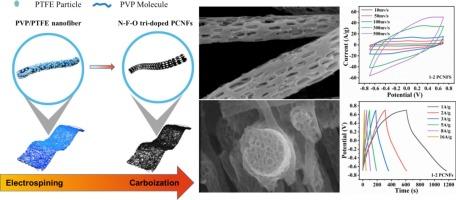电纺 PVP/PTFE 纳米纤维衍生出的可调 N-F-O 三掺杂柔性分层多孔碳纳米纤维,可实现用于能量存储的高电化学性能
IF 8.9
2区 工程技术
Q1 ENERGY & FUELS
引用次数: 0
摘要
多孔碳纳米纤维(PCNFs)具有丰富的离子、分子和纳米粒子传输途径的优势,但控制其多孔结构仍是一项重大挑战。本研究采用聚四氟乙烯(PTFE)作为孔隙形成剂,聚乙烯吡咯烷酮(PVP)作为碳前驱体,利用宏微双相分离法制备了具有分层孔隙结构的柔性、几何形状可调的 PCNFs。带负电荷的聚四氟乙烯模板与带正电荷的 PVP 碳前驱体交联,形成稳定的电纺丝溶液。通过改变 PVP 与 PTFE 的质量比,可以调整 PCNF 的孔结构和孔径分布。1-2 PCNFs(1PVP/2PTFE)具有较高的比表面积和合理的孔隙结构和分布,因此在电流密度为 1 A/g 时具有 397.14 F/g 的高电容。此外,在电流密度为 10 A/g 时,它还具有出色的速率能力和循环稳定性,5000 次循环后电容保持率超过 100%,库仑效率保持在 96.5% 以上。本文提出的分层多孔结构、N-F-O 三元掺杂和高导电率网络有效地提高了 PCNFs 薄膜的电化学性能。本研究采用的方法可有效实现高性能电极材料,在储能领域具有广阔的潜在应用前景。本文章由计算机程序翻译,如有差异,请以英文原文为准。

Tunable N-F-O tri-doped flexible hierarchical porous carbon nanofibers derived from electrospun PVP/PTFE nanofibers towards high electrochemical performance for energy storage
Porous carbon nanofibers (PCNFs) offer the advantage of abundant pathways for ion, molecule, and nanoparticle transport, but controlling their porous structure remains a significant challenge. This study employed polytetrafluoroethylene (PTFE) as a pore-forming agent and polyvinylpyrrolidone (PVP) as a carbon precursor to prepare flexible, geometrically adjustable PCNFs with a hierarchical pore structure using a macro-micro dual-phase separation method. The negatively charged PTFE template crosslinks with positively charged PVP carbon precursor, forming stable electrospinning solution. By varying the mass ratio of PVP to PTFE, the pore structure and pore size distribution of PCNFs can be adjusted. 1–2 PCNFs (1PVP/2PTFE) exhibit high capacitance of 397.14 F/g at a current density of 1 A/g due to their higher specific surface area and reasonable pore structure and distribution. Additionally, it has excellent rate capability and cyclic stability at a current density of 10 A/g with a capacitance retention exceeding 100 % and coulombic efficiency remaining above 96.5 % after 5000 cycles. The hierarchical porous structure, N-F-O ternary doping, and high conductivity network proposed in this paper effectively enhance the electrochemical performance of PCNFs films. The method employed in this study can effectively realize high-performance electrode materials, with promising prospects for potential applications in energy storage.
求助全文
通过发布文献求助,成功后即可免费获取论文全文。
去求助
来源期刊

Journal of energy storage
Energy-Renewable Energy, Sustainability and the Environment
CiteScore
11.80
自引率
24.50%
发文量
2262
审稿时长
69 days
期刊介绍:
Journal of energy storage focusses on all aspects of energy storage, in particular systems integration, electric grid integration, modelling and analysis, novel energy storage technologies, sizing and management strategies, business models for operation of storage systems and energy storage developments worldwide.
 求助内容:
求助内容: 应助结果提醒方式:
应助结果提醒方式:


